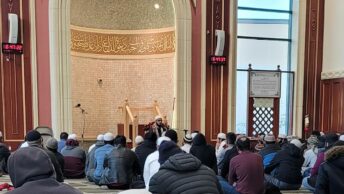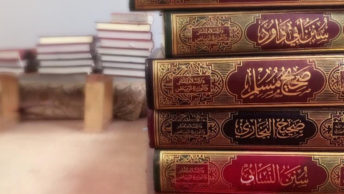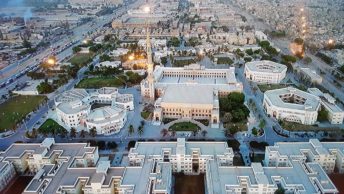A few days ago, whilst sitting in the mountains of northwest Cyprus in the company of my beloved teacher and mentor Shaykh al-Islam Mufti Muhammad Taqi Usmani (may Allah protect him and grant him well-being) and a few brothers at a barbeque, my dear friend Shaykh Hānīf Dudhwala (of Muslim Welfare Institute, UK) asked the Shaykh to share with us some of the most memorable moments of his life and occasions of happiness. Our beloved Shaykh responded by listing seven such occasions, which are presented below – in the words of Shaykh himself and then some additional commentary and background information.
It is important to keep in mind that the respected Shaykh’s whole life is filled with extraordinary accomplishments and milestones, and thus every moment of his life is worth being highlighted. Nevertheless, these seven occasions are those that he himself mentioned after being questioned on the spot and came to his mind at the time.
1) Journey to the Two Sacred lands (Haramayn) in 1963
Shaykh al-Islam Mufti Muhammad Taqi Usmani (may Allah protect him) mentioned that although he visited the blessed lands of Makka al-Mukarrama and Madina al-Munawwara when he was around 8 years old with his father Shaykh Mawlana Mufti Muhammad Shafi’ (may Allah have mercy on him) in 1951, his first ‘proper’ visit in a state of perceptiveness and awareness (shu’ur) was when he travelled for Umra in 1963 in the company of his elder brother Mawlana Wāli Razi (may Allah protect him). The whole journey, undertaken by sea with a one-week journey each way, is so memorable that it can never be forgotten and he considers it as the topmost memorable occasion of his life.
Comments:
Respected Mawlana Muhammad Wāli Razi is the elder brother of Mufti Muhammad Taqi Usmani (may Allah protect both), and the third eldest son of Shaykh Mufti Muhammad Shafi’ (may Allah have mercy on him). He is recognized as a very intelligent and educated individual. With a Masters degree in English language, he is a former teacher of Islamic studies at Karachi University and has translated some important works from Urdu to English such as “Bible to the Qur’an” and Mufti Muhammad Taqi’s work on Qadiyanism (more details to follow). Perhaps his greatest work is the 400 plus pages Sirah work titled “Hadi Alām” in which he compiled the biography (sirah) of Allah’s Messenger (peace and blessings be upon him) in Urdu without using a single letter with dots! It is indeed a phenomenal achievement for which he was recognized and duly awarded.
In relation to this memorable journey, Mufti Muhammad Taqi Usmani (may Allah protect him) mentions in his famous travel memoirs “Jāhane Didah” that he began writing details of this journey with passion and desire but unfortunately the document went missing from the ship on his return journey. Despite all efforts to try and locate the papers, they could not be found and thus details of this journey were not published. However, as he stated recently, he has covered aspects of this journey in his unpublished autobiography titled “Memories” Al-ḥamdulillāh.
2) Kiss on the forehead by his Father (1975)
The respected Shaykh mentioned that the second moment and occasion of happiness for him was when he performed Umra during Ramadan in the company of his late father – the former Grand Mufti of Pakistan Mawlana Mufti Muhammad Shafi’ (may Allah have mercy on him) – which was their final Umra together. After performing Umra, he had to bid his father farewell and then depart for Africa in the company of Shaykh Muhammad Yūsuf al-Binnori (may Allah have mercy on him) concerning a matter relating to the Qadiyani sect. His father was ill; and at the time of bidding him farewell, his father gave him a kiss on the forehead. He stated that the pleasure, sweetness and emotion he felt from that kiss is one of the most memorable moments of his life.
Comments:
Shaykh al-Islam Mufti Muhammad Taqi Usmani (may Allah protect him) elaborates further on this incident in his book “Nuqush Raftga” wherein he states that during the month of Ramadan 1395 AH (Oct 1975, approximately a year before the passing of his father) he – along with his father and Shaykh Mawlana Sayyid Muhammad Yūsuf al-Binnori (may Allah have mercy on both) – travelled for Umra. At the end of Ramadan, his father had to return to Karachi, whist he and Shaykh Yūsuf al-Binnori remained behind due to their imminent trip to Africa. His father was unwell during those days and, as such, he was so concerned about his father’s well-being that he could barely eat properly (Nuqush Raftga, p: 96).
The respected Shaykh enjoyed a very close relationship with his father, more than a normal father-son relationship. For him, his father was everything: a caring father, an insightful teacher, a perceptive Shaykh and a close comforting companion (See: Mere Walid mere Shaykh, p: 10). His father also loved him very much, given he was his youngest son and a unique one at that! His father was old, frail and undergoing health issues, and thus it is possible that Mufti Muhammad Taqi Usmani may have wondered deep inside whether this may be their final meeting. One can only imagine how difficult that moment of separation between father and son would have been; and the feelings, emotions and sentiments our dear and beloved Shaykh felt when his father kissed him on the forehead.
This incident also teaches us that such sentiments should not come in between important works for the dīn of Allah Most High. There are numerous examples before us in the lives of Prophets, Companions (sāhaba) and early Muslim scholars and predecessors (sālāf). The story of Sayyidunā Ibrahim (peace be upon him) leaving his wife Hajira and their newly born son, Isma’il, alone in an un-inhabited, barren valley is known to everyone.
It is worth noting, however, that this is not the general rule; rather, it depends on one’s circumstances. It is not always praiseworthy to leave one’s family, rather it is blameworthy on certain occasions. As such, one should consult reliable scholars if faced with a similar situation. Nevertheless our dear and respected Shaykh Mufti Muhammad Taqi Usmani (may Allah protect him) separated from his father, given that his father’s other children and also students were present to take care of his needs, and secondly the task at hand was an extremely important one. Along with Shaykh Muhammad Yūsuf al-Binnori (may Allah have mercy on him) and others, he travelled first to Nairobi (Kenya) and then to some other African countries in order to highlight the importance of believing in the finality of Prophethood (khatm al-nubuwwa) and make local Muslims aware of the Qadiyani sect. The issue of khatm al-nubuwwa was very close to the heart of Shaykh Muhammad Yūsuf al-Binnori (may Allah have mercy on him) and he thus worked passionately and tirelessly for this cause during his life. Our beloved Shaykh Mufti Muhammad Taqi Usmani (may Allah have mercy on him) seems to have inherited this passion from Shaykh al-Binnori, with whom he worked for this cause and continues to do so till today.
3) Qadiyani/Ahmadiyya Community Declared as Non-Muslims (1974)
Shaykh al-Islam Mufti Muhammad Taqi Usmani (may Allah protect him) mentioned that the third memorable moment of his life and occasion of happiness for him was when he wrote the book on the topic of “finality of Prophethood” (khatm al-nubuwwa). The book was presented before the National Assembly of Pakistan and thus resulted in the decision being given in favour of Muslims and the Qadiyanis declared as non-Muslims. The book titled “Qadiyani Fitna aur Millat-e-Islamiyya ka Mawqaf” (The Qadiyani sect and the Position of the Muslim Umma) was penned, printed, bound and published in one week.
Comments:
The success of the 1974 Khatm Nubuwwa movement (tahrik) in Pakistan is probably one of the greatest achievements in the short history of the country. Muslims had been trying from the outset to have a law passed which declared the Qadiyanis as a non-Muslim minority group, but to no avail. Finally, in 1974, under the leadership of Shaykh Muhammad Yūsuf al-Binnori (may Allah have mercy on him), Muslims of all backgrounds and religious inclinations united and applied pressure on the Pakistan Government to pass the law. After months of hard work and campaigning, the date of September 7 was set for a final decision to be made. The leaders of both groups representing the Qadiyani/Ahmadiyya community – the Lahori and Qadiyani groups – presented their case before the national assembly, whilst the position of the Muslims was presented in the form of the book “Qadiyani Fitna aur Millat-e-Islamiyya ka Mawqaf” which Shaykh al-Islam was referring to.
As he mentioned, the book was written within a week under the guidance and direction of Shaykh al-Binnori (may Allah have mercy on him). Part one of the book was written by our Shaykh, which is the main part since it comprises tackling the Qadiyani beliefs from a religious perspective. The second part was written by the late Mawlana Sami’ al-Haq Shahid (may Allah have mercy on him) who was recently martyred in Pakistan. He dealt with the political aspect, detailing the political ambitions of the Qadiyanis. The book was published and distributed to the members of the assembly, and after much debate and deliberation the Pakistan state constitutionally declared both groups of the Qadiyani/Ahmadiyya community a non-Muslim minority on 7 September 1974.
As soon as the news was broadcasted, Muslims worldwide rejoiced and thanked Allah Most High; such collective rejoicing and happiness had never been witnessed before. The great recent scholar of Pakistan Shaykh Mawlana Yūsuf al-Ludhyanawi (may Allah have mercy on him) called it a miracle of Islam of the fourteenth century. The leader of the whole campaign, Shaykh Muhammad Yūsuf al-Binnori, was also overjoyed and he received letters of congratulations from across the world. (See: Shakhsiyyat wa Ta’atthurat, p: 89-100)
From the above, it is not difficult to see why Shaykh al-Islam Mufti Muhammad Taqi Usmani (may Allah protect him) considers this incident as one of the most memorable of his life. The Qadiyanis being constitutionally declared as non-Muslims is a historical and revolutionary achievement in Pakistan, and the book he co-authored was the foundation upon which they were declared as non-Muslims. The book was later translated into English under the title “Qadiyanism on Trial: The Case of the Muslim Umma against Qadiyanis presented before the National Assembly of Pakistan” by Shaykh’s elder brother Mawlana Muhammad Wāli Razi, and also into Arabic. It is a must-read for those who want to understand the issue of Khatm al-Nubuwwa and the beliefs of the Qadiyanis.
4) Enforcement of Hudud Ordinances (1979)
Another occasion which Shaykh al-Islam Mufti Muhammad Taqi Usmani (may Allah protect him) described as one of the most memorable moments of his life was when, as a member of the “Council of Islamic Ideology” (Islami nazriyati council), Allah enabled him/granted him tawfiq to formulate and draft Islamic laws. President Zia ul Haq enforced these laws on 12 Rabi’ al-Awwal. The whole of Islamabad was rejoicing that day, he said, and because I had a part to play in it their happiness and rejoicing was directed mostly at me.
Comments:
The Council of Islamic Ideology, established in 1962, is a constitutional body that advises the Government of Pakistan on whether a certain law is contradictory to the Qur’an and Sunna. Shaykh al-Islam Mufti Muhammad Taqi Usmani (may Allah protect him) remained part of the council during the era of the former President of Pakistan Muhammad Zia ul Haq, and upon his orders the Shaykh formulated Islamic penal law (hudud ordinances) to be enforced by law. Pakistan as a country was formed on the idea of Islamization of its laws, but for many years there was no real movement in this regard. For the first time, during President Zia ul Haq’s reign, Islamic penal law were enacted by law. The draft had been completed in 1978, and President Zia ul Haq decided to enforce them on 10 February 1979 as an Ordinance. Laws were introduced in relation to Zakat and Ushr, offences against property, adultery (zina), false accusation of adultery (qazf), theft, drinking alcohol and other matters.
Mufti Muhammad Taqi Usmani (may Allah protect him) enjoyed a good relationship with President Zia ul Haq, and the latter depended on him in matters relating to Islam (details of which can be seen in Nuqush Raftga). As such, when it came to formulating Islamic laws and the implementation of Shari’a law in Pakistan, based mainly on the Hanafi madhab, the former President once again turned to Shaykh and thus he played a major role.
One can imagine how our dear and beloved Shaykh felt when the laws were finally decreed and enacted by the President. The country which was created on the idea of Islamization of its laws, and for which his father and elders gave great sacrifices, finally embraced Islamic penal law as part of its legal framework. His hard work had come to fruition, for which he was thankful to Allah and felt internally happy.
5) Completion of Arabic Commentary on Sahih Muslim (1994)
The fifth memorable event of his life and an occasion of happiness described by Mufti Muhammad Taqi Usmani (may Allah protect him) was when he completed his Arabic commentary on Imam Muslim’s Ṣaḥīḥ, tilted Takmilat Fath al-Mulhim. He stated that in celebration of the completion of this work, a gathering (walima) was organized in Dar al-Ulum Karachi attended by many great scholars. The great master of hadith (hafiz) Ibn Hajar al-Asqalani (may Allah have mercy on him) also arranged a similar celebratory gathering upon the completion of his commentary on Imam Bukhari’s Ṣaḥīḥ, tilted: Fath al-Bari. He said that the celebratory gathering for Takmila Fath al-Mulhim occurred later, but the actual moment of happiness for him was when he was writing the final sentence of the work, and felt happy that Allah granted him the tawfiq to complete the work.
Comments:
One of the greatest and most important works carried out by Shaykh al-Islam Mufti Muhammad Taqi Usmani (may Allah protect him) is his monumental Arabic commentary on Imam Muslim’s Ṣaḥīḥ, tilted Takmilat Fath al-Mulhim. This 6-voulme work, in which he completed the earlier commentary of Allama Shabbir Ahmad Usmani (may Allah have mercy on him), attained recognition of scholars and students of knowledge from around the world. Shaykh Yusuf al-Qaradawi (may Allah preserve him) states regarding this commentary, “I have found in this commentary the touch of amuhaddith, competency of a jurist (faqīh), astuteness of a teacher, forbearance of a judge and insight of a contemporary scholar – side by side.”
It took our dear Shaykh a good part of 18 years to complete it (with breaks in between due to travels and other tasks), and finally in 1994 the task was accomplished. A celebratory gathering was arranged by the seniors of Dar al-Ulum (Karachi), with attendance from a number of great scholars from around Pakistan and beyond. Many scholars spoke at the event, and it is in this gathering where some of them – such as his teacher Shaykh Mawlana Subhan Maḥmūd (may Allah have mercy on him) – granted our Shaykh the title of “Shaykh al-Islam.”
One can only imagine the feeling and internal joy he must have felt when writing those last few lines of this monumental work! He writes in those final few lines, “Through the granting (tawfiq) and grace (fadl) of Allah, this commentary has been completed on the afternoon of Monday 26 Safar 1415 AH (August 1994).” He then went on to say: “I ask Allah, the Glorified and Majestic, to make this humble work purely for His sake and a means of protection for this weak slave from His punishment and displeasure, and to accept it in His lofty court. I ask Allah to forgive me for any shortcomings or bad etiquette during the course of this work. Our Lord, accept (this service) from us, for indeed You – and You alone – are the All-Hearing, the All-Knowing; and accept our repentance, for indeed You – and You alone – are the Most-Relenting, the Very-Merciful.”
6) Completion of Qur’an Translation in Urdu (2008)
Shaykh al-Islam Mufti Muhammad Taqi Usmani (may Allah protect him) stated that the sixth occasion of happiness for him was when he completed translating the Noble Qur’an into the Urdu language.
Comments:
The Shaykh has translated the Noble Qur’an into Urdu with explanatory notes, titled: “Asān tarjama Qur’ān tashrihāt ke sāth” (Simple translation of the Qur’an with explanatory notes). It is a great honour for anyone to translate the words of Allah Most High, and thus it is easy to understand why our beloved Shaykh was overwhelmed and internally happy when Allah granted him the tawfiq to complete it. In the introduction of his Urdu translation, he writes, “I am presenting this service (khidma) of [translating] the Noble Qur’an with the realization that I do not possess the knowledge (ilm) and piety (taqwa) required for translating this unparalleled speech (kalam). However the Generous Lord, Whose speech this is, can take whatever work He wants from any insignificant being…”
The translation, the majority of which was done during his travels, was completed in the blessed month of Ramadan. The Shaykh writes at the end of his translation: “Allah Most High – through His grace (fadl), granting (tawfiq) and bounty (karam) – made this service of the Noble Qur’an reach its completion tonight the 17th night of Ramadan 1429 AH (Wednesday 18 September 2008). O Allah, I do not possess any tongue or pen worthy enough to thank You, for You have granted an insignificant being the ability to translate Your Noble Speech. O Allah, when You have granted this ability (tawfiq), accept it out of Your sheer grace and bounty. Make it a means of all the hurdles from the grave to resurrection easy for this unworthy translator, and a treasure for the hereafter; and instil in the hearts of the readers a desire to understand the Noble Qur’an, act upon it and spread its sacred message.”
May Allah accept these supplications (ad’iya) of the Shaykh and grant us all the ability to recite the book of Allah, understand it and act upon it, Āmīn.
7) Completion of Qur’an Translation in English (2005)
Shaykh al-Islam Mufti Muhammad Taqi Usmani (may Allah protect him) stated that the seventh occasion of happiness for him was when he completed translating the Noble Qur’an into the English language.
Comments:
The respected Shaykh’s English translation is titled “The Meanings of the Noble Qur’an” and widely accepted and referred to by English-speaking Muslims throughout the world. It is undoubtedly one of his great accomplishments, Al-ḥamdulillāh, from which thousands of Muslims are benefiting. It is unique in the fact that it is the first direct translation of the Noble Qur’an undertaken in English by a scholar of traditional Islamic sciences. He had previously supervised the English translation of his father’s Ma’arif al-Qur’an, but this translation and brief explanatory notes have been rewritten entirely.
Being granted the ability (tawfiq) to translate the book of Allah is undeniably a means of happiness and joy, and thus one can understand why it brought happiness to our Shaykh’s heart. The English translation was in fact published prior to the Urdu one in 2005.
May Allah Most High accept all the efforts of our Shaykh al-Islam Mufti Muhammad Taqi Usmani, protect him, grant him well-being (a’fiya) in both worlds, and allow him to continue with many more services for His dīn. May He allow us to benefit from his works and the works of all our scholars, Āmīn.
Muhammad ibn Adam al-Kawthari
Leicester, UK
July 15, 2019






